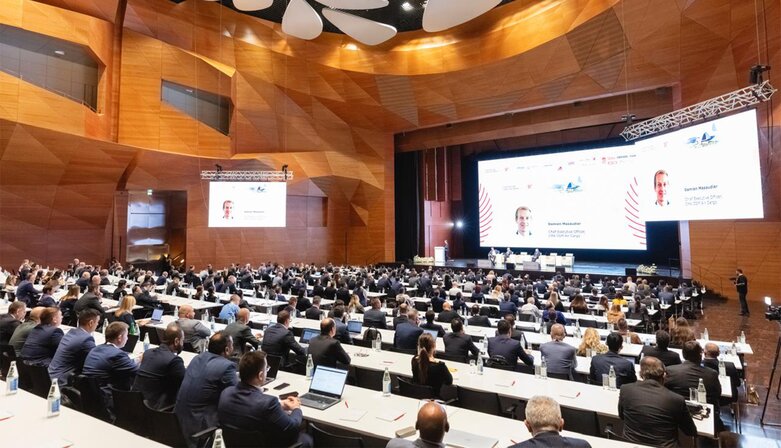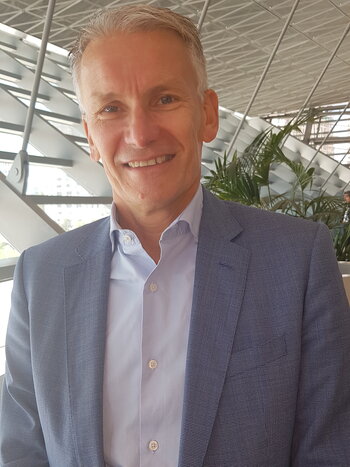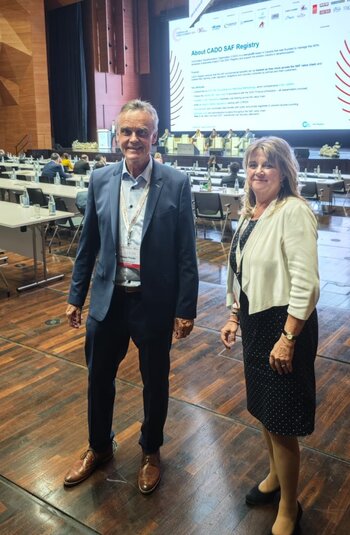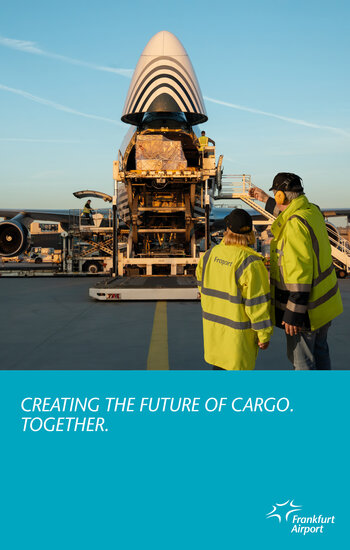The 10th Caspian Air Cargo Summit, hosted by Silk Way West Airlines at the futuristic Baku Convention Center, cemented Azerbaijan’s position as a fast-evolving logistics hub on the Middle Corridor, connecting the Far East and Europe. Orchestrated by Natalie and Lars-Gunnar Comén of Swedish event manager, Euroavia International, the trade show offered an attractive program and a wealth of information.
In addition to a plethora of inspiring presentations and networking opportunities, the framework program was also impressive, culminating in a gala dinner at Buta Palace. It also included a visit to the construction site of the new airport and, alternatively, a sightseeing tour of Baku. A total of 420 attendees took part in this anniversary event.

Compared to previous Caspian shows, the large number of visitors from Azerbaijan and neighboring Central Asian states was striking. This is further evidence of Baku’s growing importance as a logistics hub in the CIS countries.
On the sidelines of the event, CargoForwarder Global asked participants about their reasons for attending and what their impressions of the trade show were. Here is a selection of comments that are not representative but are likely to be shared by the vast majority of participants:
Sebastiaan Scholte, CEO Kales Group
The Caspian Air Cargo Symposium was worth attending. The speakers were of high quality, a wealth of exciting topics were tabled, and it was important to learn details first-hand about the Alat Free Economic Zone, the future Cargo Airport, and the Cargo Village Project in direct exchange with experts. As part of the Middle Corridor and located at the crossroads of Europe, Central Asia, and the Far East, the geographical location of the future multimodal hub, which also includes shipping, road, and rail services, is excellent.

Those responsible at the Silk Way Group and the Azeri government have recognized that a strong airport can only go hand in hand with a strong home carrier. This is the global rule, with Liège being the only exception in Europe. From this perspective, the new airport south of Baku, which will serve as Silk Way West Airlines’ hub once it becomes operational in 2026, will play a key role in the airline’s further development as a connector between China and Europe. It will be equipped with state-of-the-art technology which will ensure efficient ground processes, as highlighted by experts at the Symposium, and it will be managed digitally. For Silk Way West, such a home base will be a quantum leap. The carrier’s growing international role is also reflected in the airline’s fleet policy. In addition to its fleet of Boeing 777F, 747-8F, and 747-400F aircraft, it will add 10 Boeing 777F and 4 Airbus A350F aircraft to its fleet by 2030, to meet global cargo demand as its CEO, Wolfgang Meier, emphasized in his presentation. I would like to add that the economy in the Central Asian hinterlands is constantly growing, so is the population in Azerbaijan and the neighboring region. All in all, I am convinced that the prospects for the infrastructure project and the development of Silk Way West are very positive.

Bernhard Kindelbacher, CEO ACL Airshop
The Caspian Air Cargo Symposium could be titled: “The Middle Corridor Up Close”. The multimodality of air, sea, road, and rail transport was clearly illustrated, along with the associated business opportunities for Azerbaijan and the entire transport industry. Geographically, Baku is extremely well positioned within the Middle Corridor, which will get a further boost by the new airport and the surrounding economic free zone, where manufacturing industries will settle. It can be expected that this will further bolster the reputation of Baku and the country as an emerging transport hub on the Far East-Europe axis. Silk Way West is making an important contribution to this, signaling the market a spirit of optimism far beyond Azerbaijan’s borders, combined with high quality standard in daily processes.
These contexts were emphasized repeatedly by speakers and panelists at the conference. However, it is also clear that a lot of work still needs to be done to achieve the infrastructure and transport goals that have been set. Those responsible will certainly not overlook the competition from the Istanbul hub, which is a serious competitor in the greater region, especially in air traffic, thanks to its new airport at the Black Sea and the broad global network offered by home carrier, Turkish Airlines, and other players serving the airport.
Almas Kulibayev, CEO Mercury Energy LLP
As a Kazakhstan-based energy provider, our main business consists of refueling aircraft, among other services provided by our company. We decided to attend the Caspian Air Cargo Summit, to personally experience how our local industrial partners have developed lately. After all, Baku is a key point of the Middle Corridor where business is developing quite rapidly. Our company, Mercury Energy, is a future partner of the new airport, providing an important chunk of fuel that will be needed there to secure daily air and ground operations. Our aim is to contribute to the development of the logistics companies that intend to settle in ALAT Free Zone after the groundwork is completed, and the infrastructure is in place. In addition, our holding will manage a warehouse and the upcoming railway terminal. So, we had plenty of reasons to show up in Baku to attend the Caspian trade show excellently orchestrated by event manager, EuroAvia International.

Ruediger Franke / Isabella Zoerner-Schmelz, TRIWO Hahn Airport
Ruediger: Hahn Airport has had fruitful business relations with the Central Asian region and some of the airlines based there, for quite some time. This applies particularly to Silk Way West, whose freighters regularly land at Hahn Airport. Therefore, it made sense for us to seize the opportunity to present ourselves in Baku, deepen existing contacts, and engage in direct talks with business partners. Another important aspect was to get a first-hand impression of the new airport and learn how construction work is progressing. What we experienced is that there is a needs-based infrastructure policy. Countries like Azerbaijan but also Kazakhstan and others in Central Asia, recognize economic opportunities and unleash growth. It is fascinating to see how quickly decisions are put into practice without lengthy discussions, and by removing bureaucratic hurdles. We are proud that Silk Way West freighters land at our airport and that we have been part of our customers’ supply chain for a long time.

Isabella: I have actively accompanied the development of Silk Way West at Hahn Airport over a long period of time. The airline is a very consistent and reliable partner, open to discussions and new ideas. A striking feature is that its management has always strived, and continues to strive, to deepen its relationships with shippers and their forwarding agents. In addition to meetings with the Silk Way management, the attractive program of the Caspian Cargo Summit also motivated us to attend the event in Baku in person.




